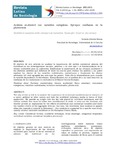Analisis multinivel con variables categóricas. Ejemplo: confianza en la plutocracia

Ver/
Use este enlace para citar
http://hdl.handle.net/2183/22563
A non ser que se indique outra cousa, a licenza do ítem descríbese como Atribución-CompartirIgual 3.0 España
Coleccións
Metadatos
Mostrar o rexistro completo do ítemTítulo
Analisis multinivel con variables categóricas. Ejemplo: confianza en la plutocraciaTítulo(s) alternativo(s)
Multilevel analysis with categorical variables: example, trust in plutocracyAutor(es)
Data
2016Cita bibliográfica
Revista Latina de Sociología,2016,6(1):1-26.ISSN: 2253-6469
Resumo
[Resumen] El objetivo de este artículo es analizar la importancia del ámbito contextual además del individual en las investigaciones sociales, políticas o de otro tipo y el funcionamiento de la técnica multinivel para su aplicación. Explicamos la importancia de las técnicas multinivel y los distintos modelos que debemos de tener en cuenta para realizar los análisis y así poder explicar los efectos de las variables individuales, contextuales y finalmente los efectos aleatorios del nivel agregado (en este caso los países). Todo ello lo desarrollamos para cuando la variable dependiente es dicotómica. Ejemplificamos con el análisis de a un caso concreto, la confianza de los ciudadanos en exclusiva en el Banco Central Europeo. [Abstract] The aim of this article is to analyse the importance of contextual considerations in research of a social, political or other nature and how the multilevel technique works in terms of their application. We provide an insight into the key role played by multilevel techniques and the various models that must be taken into consideration in order to carry out the analyses and thereby provide an explanation for the effects of individual and contextual variables and lastly the random effects of the aggregate level (in this case, the countries). Said analysis is applied when the dependent variable is dichotomic. Our analysis is supported by a specific case study, namely citizens’ exclusive confidence in the European Central Bank.
Palabras chave
Factores contextuales
Técnica multinivel
Stata xtmelogit
Respuestas categóricas
Variables individuales
Variables contextuales
Plutocracia
Contextual factors
Multilevel technique
Categorical responses
Individual variables
Contextual variables
Plutocracy
Técnica multinivel
Stata xtmelogit
Respuestas categóricas
Variables individuales
Variables contextuales
Plutocracia
Contextual factors
Multilevel technique
Categorical responses
Individual variables
Contextual variables
Plutocracy
Versión do editor
Dereitos
Atribución-CompartirIgual 3.0 España
ISSN
2253-6469
Ítems relacionados
Mostrando ítems relacionados por Título, autor ou materia.
-
Dv2v: A Dynamic Variable-to-Variable Compressor
Brisaboa, Nieves R.; Fariña, Antonio; Gómez-Brandón, Adrián; Navarro, Gonzalo; Varela Rodeiro, Tirso (IEEE, 2019-03)[Abstract]: We present D-v2v, a new dynamic (one-pass) variable-to-variable compressor. Variable-to-variable compression aims at using a modeler that gathers variable-length input symbols and a variable-length statistical ... -
Genetic programming for feature selection in business failure prediction. Comparison of the use of financial variables and economic environment variables
Beade, Angel; Rodríguez López, Manuel; Santos Reyes, José (IEEE, 2024)[Abstract]: In this work we have experimented with the use of genetic programming as a feature selection method as well as a classifier to obtain business failure prediction models with different prediction temporal ... -
Temporal variability of gait in Parkinson disease: effectsof a rehabilitation programme based on rhythmic sound cuesTemporal variability of gait in Parkinson disease: effectsof a rehabilitation programme based on rhythmic sound cues
Fernández-del-Olmo, Miguel; Cudeiro, Javier (Elsevier, 2004)[Abstract] It has been suggested that sequential movements in patients with Parkinson's disease (PD) might be improved by the effects of external rhythmic cues. We studied spatiotemporal gait parameters and temporal gait ...






